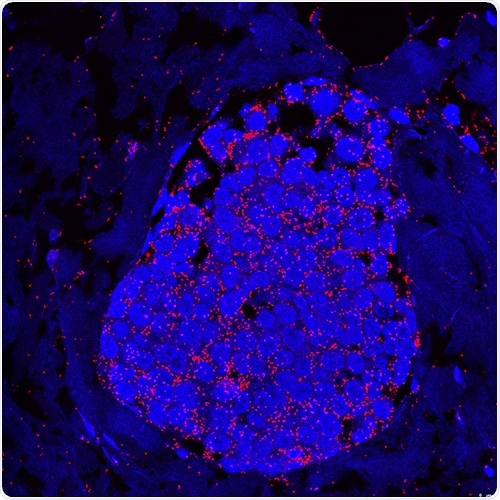Breast cancer is the most common cancer in women worldwide, yet despite medical advances, a cure for the tumors that spread locally and especially to distant sites remains out of reach.

Human breast cancer tissue sample: the blue is the nuclear stain that shows DNA of the cells. The red shows the CXCR4 and CCR7 heterodimer complex. Image Credit: University of South Australia
Now, new research from the University of South Australia has found a connection between aggressive breast cancer cells and the dual CXCR4-CCR7 cell surface protein complexes. The research shows a direct relation between the number of these associations and the severity of the disease.
This is the first time that this protein interaction has been observed in both animal and human cells.
Funded by the National Health and Medical Research Council, the study provides vital information about the mechanism of progression of breast cancers from benign to aggressive form.
UniSA researcher, Valentina Poltavets says blocking the interaction between CXCR4-CCR7 proteins could deliver novel treatments for invasive breast cancer.
Globally, breast cancer affects more 2.3 million women each year, with aggressive breast cancer accounting for more than 40 per cent of all cancer-related deaths in women. There is no current cure for metastatic tumors, which is why new therapies that can target spread of breast cancer to another organs in the body are so urgently needed. On their own, CXCR4 and CCR7 proteins are found in many cell types including breast cancer cells. But we saw that in more invasive and metastatic breast cancer cells, they are bound to each other to deliver specific signals that make these cells grow and move quickly".
Valentina Poltavets, UniSA Researcher
The research team also created a system that forced these proteins to interact on the cell surfaces of non-invasive breast cancer cells, demonstrating how they will make the cancer cells more aggressive and invasive.
Amid the COVID-19 pandemic, 98 per cent of breast screens have been canceled or delayed across Australia, putting thousands of women at greater risk.
Poltavets says while research continues to improve breast cancer survival rates, more investment is needed to tackle hard-to-treat breast cancers.
"There's no doubt that research is advancing our knowledge in breast cancer. Step by step, we're determined to find a cure for this devastating disease."
Source:
Journal reference:
Poltavets, V., et al. (2021) CXCR4-CCR7 Heterodimerization Is a Driver of Breast Cancer Progression. Life. doi.org/10.3390/life11101049.